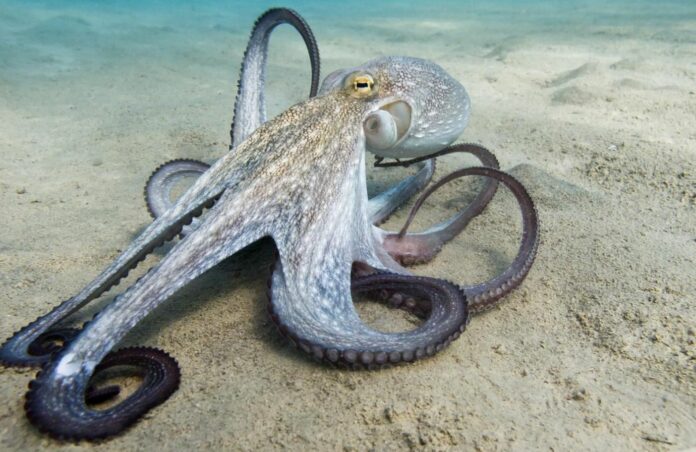Octopuses and humans possess shared genes related to cognitive functions like learning and memory. These genes in humans exhibit notable activity within the hippocampus, a crucial brain structure responsible for controlling neural processes associated with learning.
The octopus is an extraordinary creature with an intricately complex brain and exceptional cognitive abilities that set it apart from other invertebrates. In fact, its cognitive prowess is so remarkable that, in certain aspects, it shares more similarities with vertebrates than with other invertebrates.
A study published in BMC Biology and led by Remo Sanges from SISSA of Trieste and Graziano Fiorito from Stazione Zoologica Anton Dohrn of Naples unveiled a molecular connection between the brains of humans and two octopus species: Octopus vulgaris (common octopus) and Octopus bimaculoides (Californian octopus). This discovery has the potential to unlock the secrets behind the intelligence of these captivating organisms.
The sequencing of the human genome in 2001 revealed that over 45% of it consists of sequences known as transposons, commonly referred to as “jumping genes.” These transposons have the ability to “jump” from one location to another within an individual’s genome through mechanisms involving molecular copy-and-paste or cut-and-paste processes, thereby shuffling or duplicating genetic material. In most cases, these mobile elements remain inactive, lacking any observable effects and losing their mobility over generations. Some transposons are inactive due to accumulated mutations, while others are intact but restrained by cellular defense mechanisms. From an evolutionary standpoint, even these fragments and broken copies of transposons can serve as valuable “raw materials” that evolution can shape and utilize.
Among the mobile elements, the most significant ones belong to the family known as Long Interspersed Nuclear Elements (LINEs), which are present in hundreds of copies in the human genome and retain their potential for activity. Traditionally, LINEs were considered remnants of past evolutionary processes, mere vestiges of the mobile elements’ involvement in shaping genetic material. However, recent evidence has emerged indicating that their activity is finely regulated in the brain. Many scientists believe that LINE transposons are linked to cognitive abilities such as learning and memory, with their heightened activity observed primarily in the hippocampus—the brain’s crucial structure for neural control over learning processes.
Similar to our own genome, the genome of the octopus is replete with jumping genes, although most of them remain inactive. The researchers focused on transposons that retain their copy-and-paste capability and identified a LINE element within the parts of the octopus brain that are vital for their cognitive abilities. This discovery, a result of collaborative efforts between Scuola Internazionale Superiore di Studi Avanzati, Stazione Zoologica Anton Dohrn, and Istituto Italiano di Tecnologia, became feasible through next-generation sequencing techniques employed to analyze the molecular composition of active genes within the octopus nervous system.
“The discovery of an element of the LINE family, active in the brain of the two octopuses species, is very significant because it adds support to the idea that these elements have a specific function that goes beyond copy-and-paste,” explained Remo Sanges, the director of the Computational Genomics Laboratory at SISSA, who initiated this project during his tenure as a researcher at Stazione Zoologica Anton Dohrn in Naples.
Giovanna Ponte from Stazione Zoologica Anton Dohrn, sharing her excitement, added, “I literally jumped on the chair when, under the microscope, I saw a very strong signal of activity of this element in the vertical lobe, the structure of the brain which in the octopus is the seat of learning and cognitive abilities, just like thehippocampus in humans.”
According to Giuseppe Petrosino from Stazione Zoologica Anton Dohrn and Stefano Gustincich from Istituto Italiano di Tecnologia, “This similarity between man and octopus that shows the activity of a LINE element in the seat of cognitive abilities could be explained as a fascinating example of convergent evolution, a phenomenon for which, in two genetically distant species, the same molecular process develops independently, in response to similar needs.”
“The brain of the octopus is functionally analogous in many of its characteristics to that of mammals,” added Graziano Fiorito, director of the Department of Biology and Evolution of Marine Organisms of the Stazione Zoologica Anton Dohrn. “For this reason, also, the identified LINE element represents a very interesting candidate to study to improve our knowledge on the evolution of intelligence.”
Image Credit: Shutterstock
